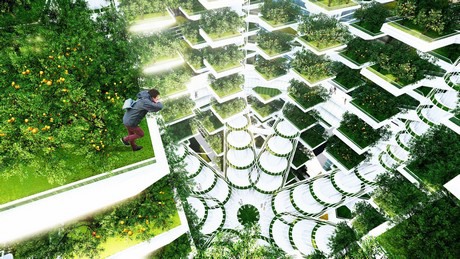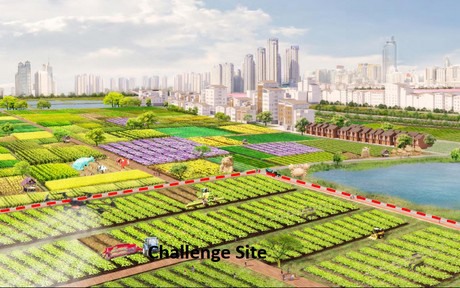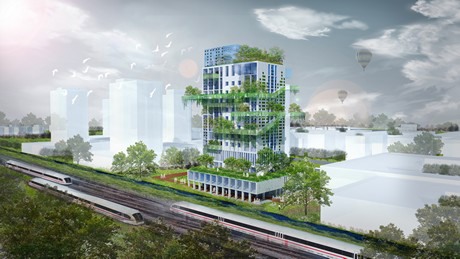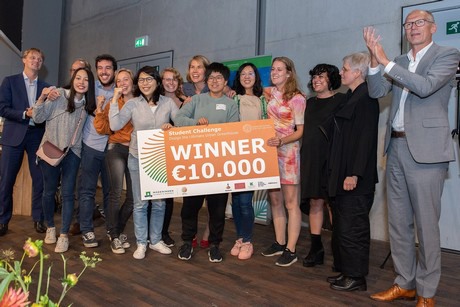After a successful first edition, the Urban Greenhouse Challenge is back. This time, student teams are developing an urban greenhouse in Dongguan, China. Fortunately, they're not left alone - partner companies, including main partners Rabobank and Country Garden Agriculture, are ready to help, and five top universities are involved: China Agricultural University, the University of São Paulo, Cornell, UC Davis, and of course Wageningen University & Research. We asked Marta Eggers, Project Officer WUR Student Challenges, to tell us a bit more about the upcoming challenge.
"Urban farming exists for a very long time already. Now there's a sort of revival of urban farming, and a lot of people are very excited about it. But we have a feeling that there's not a good model for how to do it. There's a lot of searching going on, but there's not a silver bullet solution yet."
The challenge is a way to come up with solutions that can inspire progress and boost innovation. "We want to make people enthusiastic about urban farming. We hope we can bring it to the next level", Marta says, referring to the challenge's slogan: 'Will you bring urban farming to the next level?'

Image: Spark Architects
Dongguan: Economic hub for China and the world
While the first Urban Greenhouse Challenge took place in the Netherlands, this edition is looking a bit further east. The choice for China seemed logical, given the relationship Wageningen University has with the country. "We have ongoing collaboration and very close links with China", Marta says, "and we also have a China office, so with this challenge, we're building on this collaboration."
The site itself is "one of the most fascinating areas in the world", she argues: the agropark of Dongguan is located in the Pearl River Delta Economic Zone. "It's like a special zone in China, a place where a lot of experiments take place. It's all very high tech and innovative. For instance, when paying, you don't use a credit card, but you pay with your face. It's an economic hub for China, but also for the world; it's a very fascinating place."
Part of that 'fascinating place' will be the Dongguan agropark. "It's going to be a very big project," Marta says, "with a mission to create a sort of clean island in a very urbanized area, and our project will be a part of it."

A render of the Dongguan agropark, with the challenge site in the foreground
Catalyst for change
Going beyond this particular project, the second Urban Greenhouse Challenge is really looking for a 'catalyst for change', Marta explains. "We really want to provide experiments for more innovation." Last year's challenge is evidence that this is indeed how it works - many of the participants have followed up, going further into the field of urban farming.
Another way in which the challenge seeks to be a source of inspiration is by bringing together disciplines that often don't work together, like architecture and agriculture. "Those are the groups that also don't really know each other. This will also spark new ideas and add value."

The winning design in the first Urban Greenhouse Challenge
Lessons learned
The UGC team's experience from the first edition of the challenge has geared them up for the second. "The first Urban Greenhouse Challenge was a big experiment. The idea of Wageningen organizing such a challenge came up in January 2017, and in June it was decided that the challenge would go through. So we didn't really have much time to prepare", Marta says, laughing. "When it started, we were still working out the details and running the challenge. It was crazy and very intensive, but we also learned a lot."
They used that experience for the second challenge. "We very much revised the format." The idea is the same: student teams developing a greenhouse in an urban environment and involving the local population, but a few things have been tweaked. "For instance, we have included milestones this time, we have very clear instructions for all the participating teams. We have also developed an online platform. We now have a website with a lot of functionalities to facilitate communication with teams."

Team GreenWURks, winners of the first UGC
Connecting student with companies
With the online platform that's been developed, participating students are able to get in touch with experts who can offer them advice. "We really hope that some interesting innovations will come out of this", Marta shares. "All our partners get access to the online platform, and the online platform is a meeting place. Via the online platform, you can initiate chat, which can be followed up by Skype calls or face-to-face meetings."
Getting in touch with companies isn't just beneficial for the students - there are mutual benefits. "We think this is a great HR opportunity for the companies. The people who join the challenge are really very eager students. They'd be the perfect employees because they are very ambitious, curious about the topic and very innovative."
If your company is looking to get in touch with those talented students, be sure to get in touch with the Urban Greenhouse Challenge team - they're still looking for expert partners.
For more information: WUR Urban Greenhouse Challenge
WUR Urban Greenhouse Challenge
studentchallenges@wur.nl
urbangreenhousechallenge.nl
